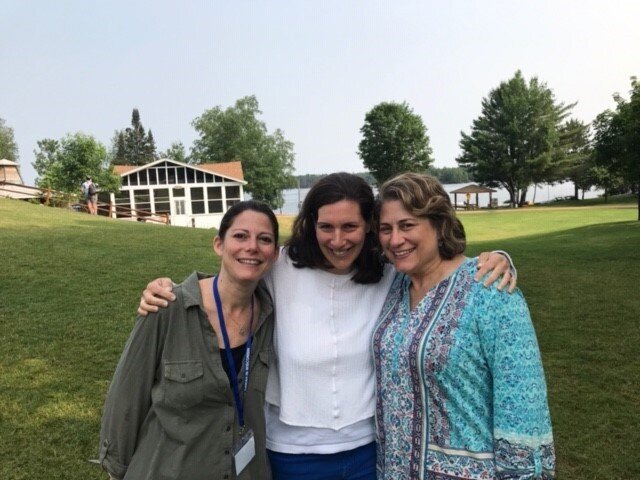Ayala Cohen is a talent agent and partner at ICM Partners. She was a producer at Saturday Night Live for nearly 20 years. She lives in New York city with her husband John Podhoretz and their three children.
Ramah Reflections
by Ayala Cohen, Nivo 1986
For those of you who don’t know me, it doesn’t take much to make me cry. I begin to tear up the minute I pull into camp—even now, as the parent of three campers. I shed a few more tears as I go to find my children—on the kikar, by the agam or in the tzrif. I cry again when I say goodbye, usually just after one or two days. I even cry when I watch the plays (my children don’t even have to be in them) over livestream. That Himnon Ramah gets me every time.
Nivo ’86 friends on the kikar last summer!
From left: Mirra Klausner, Ayala Cohen, Diane Kushnir Halivni
Did I cry when I heard that camp was cancelled? Surprisingly, no. Well, not initially at least. I let my eldest daughter Shayna, who was supposed to be Nivo ’20, do most of the crying. She sobbed for a couple of hours a day for at least a week (she would say I’m under-reporting the amount of crying). I tried to console her, but it’s hard to console someone who’s crying for good reason.
My father, Rabbi Burton Cohen, was a camper at Ramah Wisconsin the very first year camp opened in 1947. He met my mother, Roberta Cheskis, z”l, there in 1950 and later became the camp director and the national Ramah director. So it was a given in my family that once you reached a certain age (at the time, first-year Sollelim, going into 6th grade), you went to camp. Not just any camp, and not just any Ramah, but Camp Ramah in Wisconsin.
I first went to Camp Ramah in Wisconsin the summer of ’81. I think back to my six years as a camper and to my two on staff. I so looked forward to going every summer. It was the place where my “real” friends were. I liked the food, going to canteen (chanutiya), and I could even tolerate bugs and spiders for eight weeks. (Okay, when a girl found a leech on her leg from the lake, I was a little freaked out.) I learned some of my favorite show tunes in Hebrew and can still recite them, and I always found the tefillot at camp especially meaningful.
There were no sunsets more beautiful than those seen from the back of the sifriya. And the stars shone no brighter anywhere I’d ever been (I grew up a little too close to JFK Airport and New York City, so it was hard to see stars even on a clear night).
Speaking of stars, the summer I was in Bogrim, our counselors planned a surprise, middle-of-the-night activity. It was a themed party called צריף כ”ד תחת הכוכבים – Cabin 24 Under the Stars. The counselors woke us up and said we were to follow them to a picnic bench or campsite away from the cabin. We were having a star party—we could star gaze while we ate star mints, Little Debbie Star Crunch and some other star-related treats. We even made t-shirts with the slogan in Hebrew—Cabin 24 Under the Stars. It was a magical night.
I think back to that party often when I think of camp because even though it was just one evening planned very thoughtfully and carefully by our counselors (Becky Nathan and Barbara Ostrovsky), it epitomized so many things I love about camp. Many of my closest friends to this day were at that party that night. We laughed, we talked, we ate, and we shared this secret surprise activity. We wore our t-shirts proudly for the rest of the summer, and I held on to mine for many, many years beyond that.
What will a summer look like without surprise events, “real” friends, or island swims? That’s a question none of us ever imagined having to ask or to find out. It will be a summer of discovery for sure, and as I write this, my kids are eagerly getting ready to sign on to virtual camp, so they can maybe not think about it for a little bit longer.
This one goes out to צריף כ”ד (cabin 24) 1984 and to my three lovely children, Shayna, Shiri, and Isaac, who will have to try to get by without “traditional” camp for hopefully just one summer.






